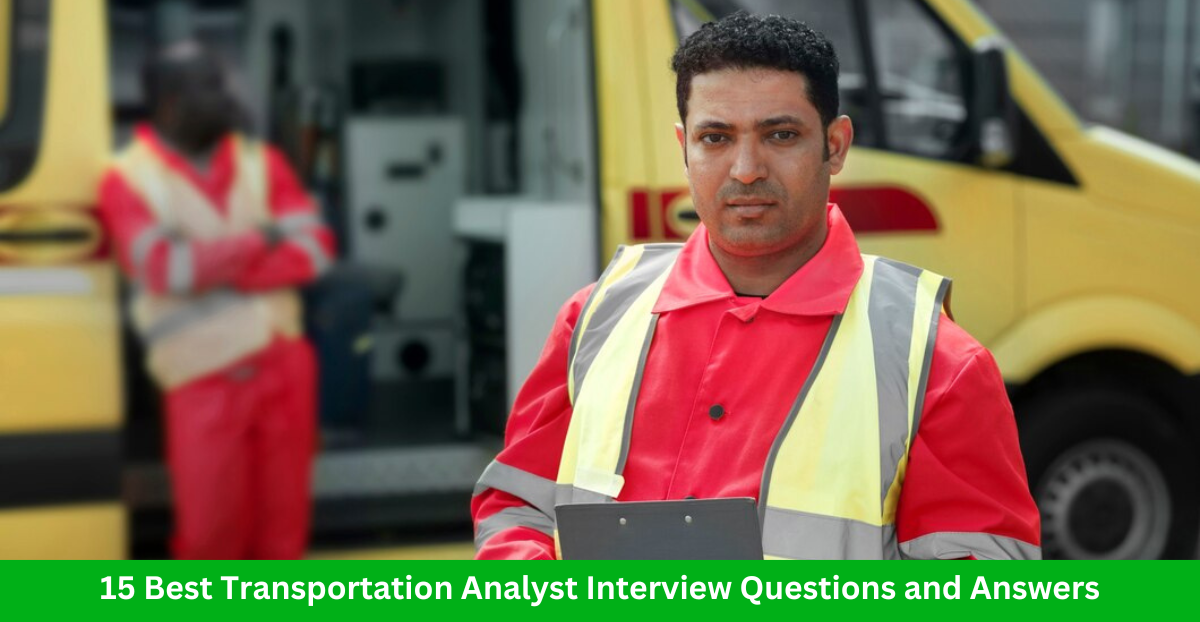15 Best Transportation Analyst Interview Questions and Answers
Transportation analyst play a crucial role in optimizing logistics and supply chain processes, ensuring efficient and cost-effective transportation systems. Preparing for an interview in this field requires a deep understanding of industry trends, tools, and problem-solving abilities. Here are 15 key interview questions and model answers to help you stand out. Best Transportation Analyst Interview Questions and Answers 1. What does a transportation analyst do? Answer: A transportation analyst evaluates and optimizes transportation systems by analyzing data, identifying inefficiencies, and recommending improvements to reduce costs, enhance delivery speed, and ensure regulatory compliance. 2. What software tools are you proficient in for transportation analysis? Answer: I have experience with: Transportation Management Systems (TMS) like SAP and Oracle. Data analysis tools like Excel, Tableau, and Power BI. Mapping software such as ArcGIS. Routing optimization tools like Route4Me and OptimoRoute. 3. How do you handle data discrepancies in your analysis? Answer: I address data discrepancies by: Verifying data sources. Cross-checking with historical data. Collaborating with teams to resolve inconsistencies. Documenting issues and ensuring accurate updates. Read Also: Top 15 GIS Specialist Interview Questions and Answers 4. What metrics do you focus on in transportation analysis? Answer: Key metrics include: Cost per shipment On-time delivery rate Fuel efficiency Freight cost as a percentage of sales Utilization of transportation assets 5. How do you optimize routes for cost savings and efficiency? Answer: I use: Advanced routing algorithms. Real-time traffic data. Historical delivery performance. Tools like GPS and GIS for accurate route planning. Collaboration with logistics teams for continuous improvement. Read Also: 10 Best Universities in the USA for 2025 6. Can you explain your approach to freight cost analysis? Answer: I: Analyze historical freight data to identify trends. Compare carrier rates and performance. Negotiate with vendors for better rates. Use predictive analytics to forecast costs. 7. What challenges have you faced in transportation analysis, and how did you overcome them? Answer: One challenge was inaccurate shipment data leading to inefficiencies. I resolved this by implementing a robust data validation process and integrating real-time tracking systems. Read Also: Top 15 Drone Operator and Analyst Interview Questions and Answers 8. How do you ensure compliance with transportation regulations? Answer: I stay updated with regulations by: Attending training and seminars. Collaborating with compliance teams. Regularly reviewing policies and ensuring alignment with operational practices. 9. What is your experience with supply chain optimization? Answer: I have optimized supply chains by: Reducing lead times through better supplier collaboration. Implementing just-in-time inventory systems. Enhancing warehouse-to-distribution workflows. Read Also: Top 15 Hydrologist Interview Questions and Answers 10. How do you manage relationships with carriers and vendors? Answer: I build strong relationships by: Regular communication and performance reviews. Negotiating fair contracts. Addressing concerns proactively to maintain partnerships. 11. What is the role of data visualization in transportation analysis? Answer: Data visualization helps: Identify trends and inefficiencies. Communicate findings effectively with stakeholders. Support decision-making through clear and actionable insights. Read Also: Top 15 Urban Planner Interview Questions and Answers 12. How do you forecast transportation demand? Answer: I use: Historical shipment data. Market trends and seasonal variations. Predictive analytics tools. Collaboration with sales and production teams for accurate projections. 13. What are your strategies for reducing transportation costs? Answer: My strategies include: Consolidating shipments to maximize truck utilization. Optimizing routes to minimize fuel consumption. Using multimodal transportation options. Negotiating better rates with carriers. Read Also: Top 22 Remote Sensing Analyst Interview Questions and Answers 14. How do you handle unexpected delays in the transportation process? Answer: I address delays by: Monitoring real-time shipment data. Communicating promptly with stakeholders. Identifying alternative solutions, such as rerouting or expedited shipping. 15. Where do you see the future of transportation analytics heading? Answer: The future includes: Integration of AI and machine learning for predictive analytics. Widespread use of IoT for real-time monitoring. Greater focus on sustainability and green logistics. Enhanced automation for faster and more accurate data analysis. Conclusion Transportation analysts play a pivotal role in streamlining logistics and improving operational efficiency. By mastering these questions and their answers, you can confidently showcase your expertise and problem-solving abilities in the field. Preparation is key to demonstrating your value and securing the role you aspire to.
